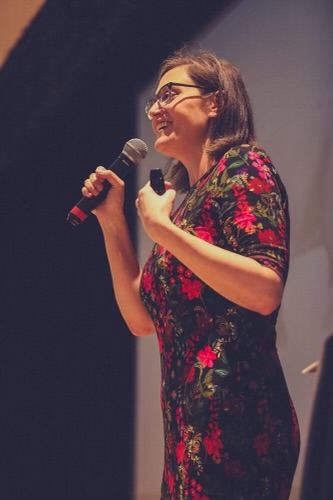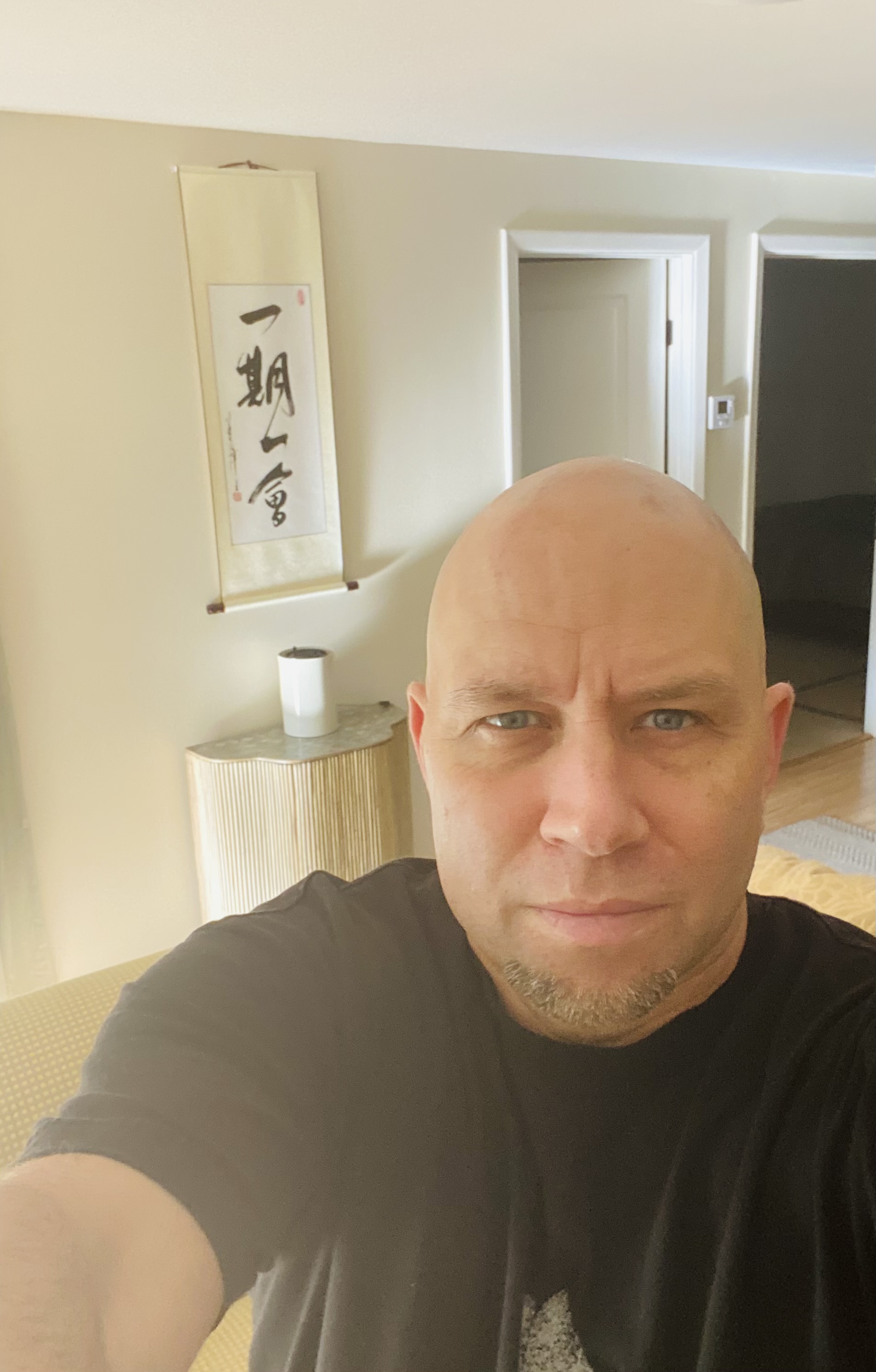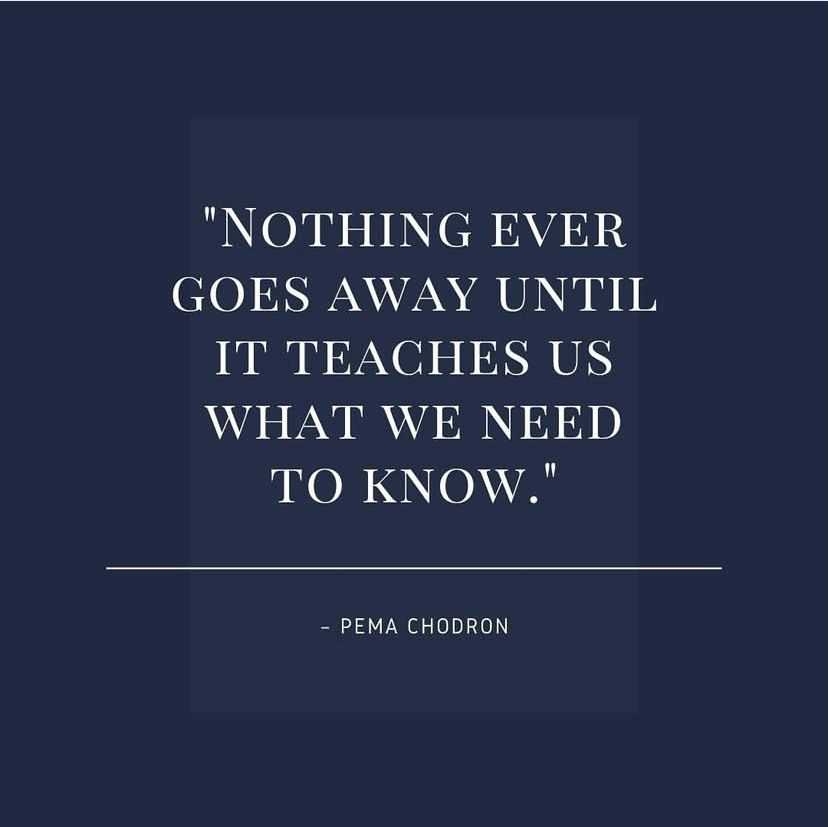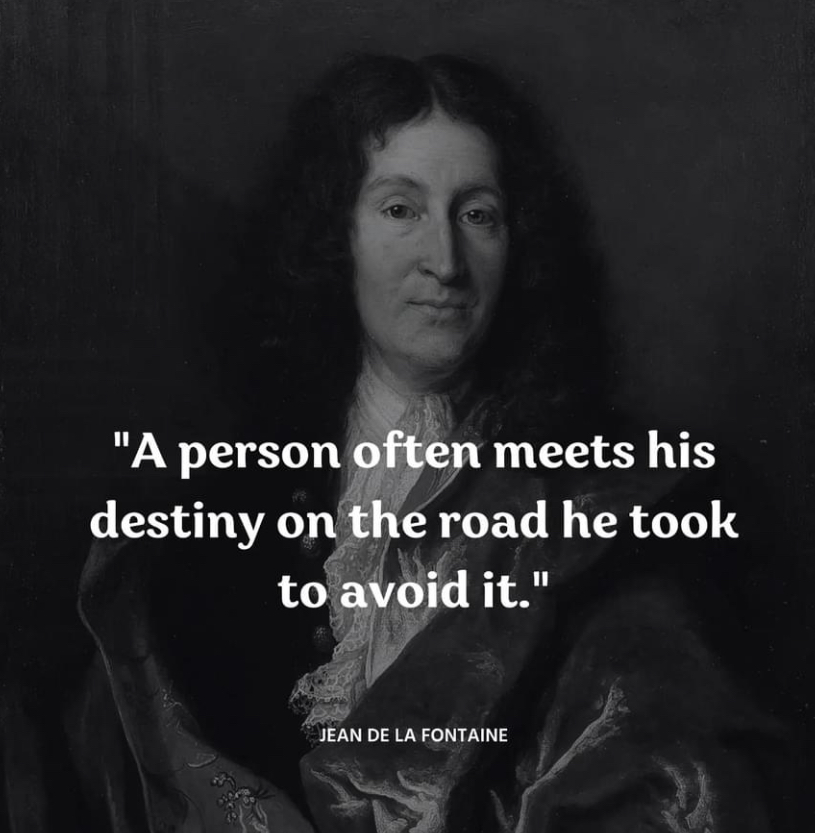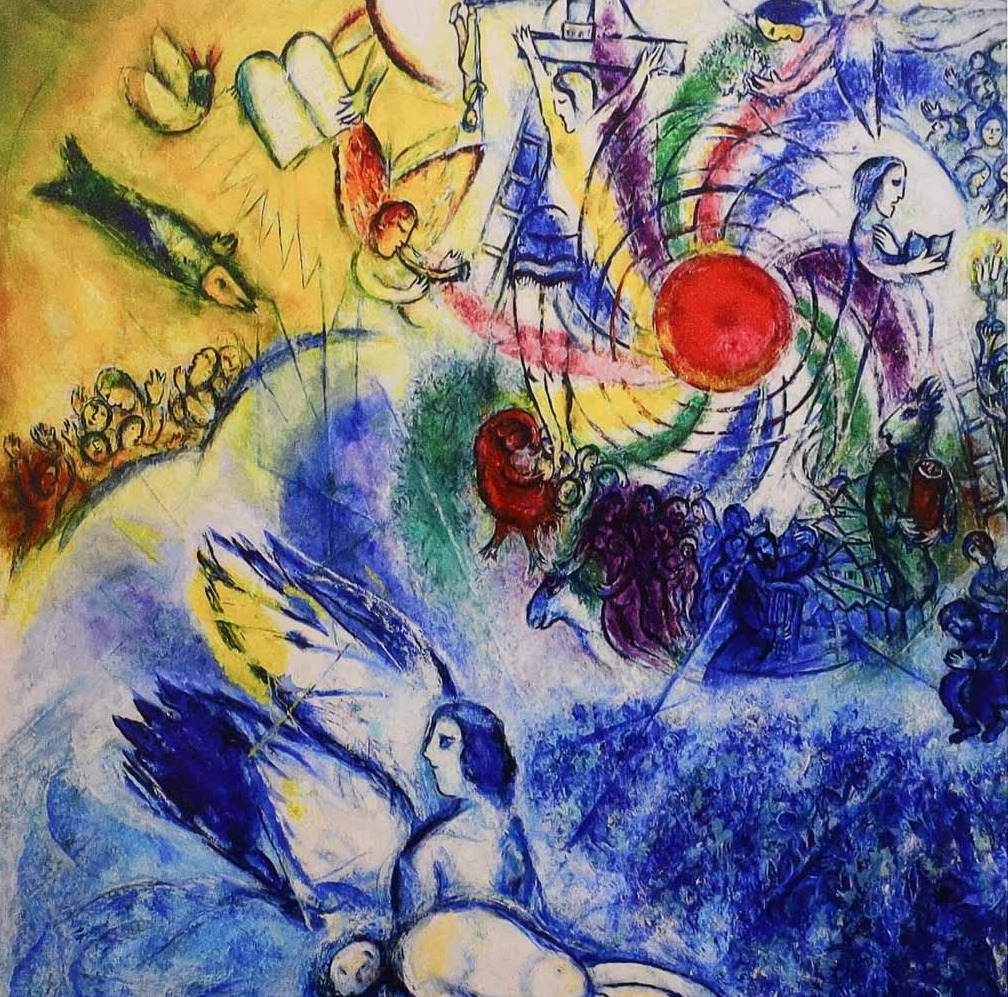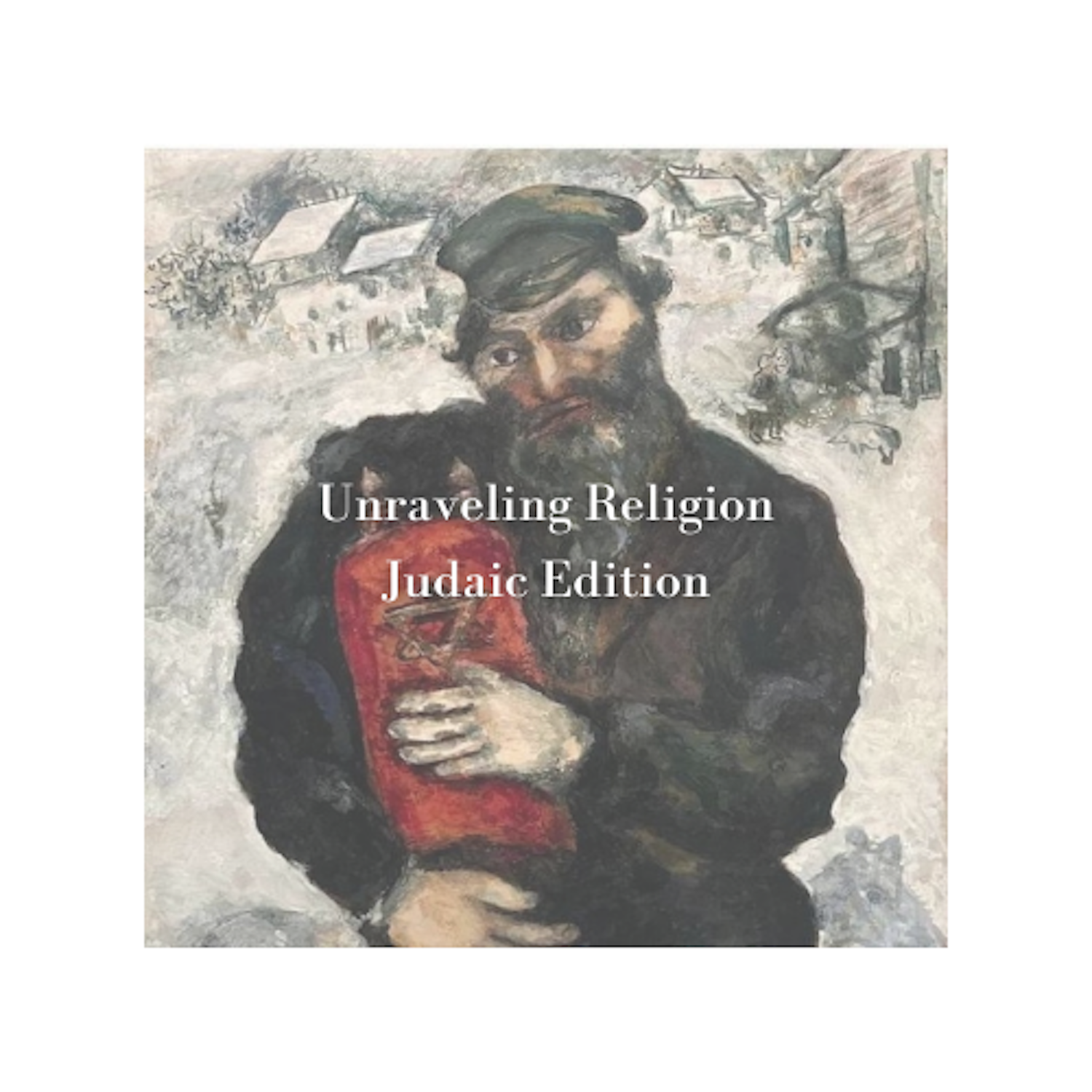Episode Transcript
[00:00:00] Speaker A: Hello everyone and welcome back. It is a pleasure to be back with you, especially today with my friend and colleague, Ezra Weinberg. Rabbi Ezra Weinberg is a rabbi, ritual musician and educator dedicated to facilitating and supporting transformative Jewish rituals. He founded Jews Get Divorce, a network of resources to support Jews going through divorce. His work is aimed at redefining the Jewish communal response to this life stage.
He is a native Philadelphian and holds a master's degree in conflict transformation.
Reb Ezra officiates weddings and Bnai Mitzvot and teaches a university course called One God, Three Paths, alongside a priest and an imam.
Welcome Reb Ezra. Pleasure to have you.
[00:00:49] Speaker B: Pleasure to be here.
[00:00:51] Speaker A: So Jews get divorced.
They do, in fact, I can confirm that they definitely do.
Tell us a little bit about you and what drew you to this particular.
I can imagine somewhat difficult work.
[00:01:06] Speaker B: So it starts back from my childhood. I grew up child of divorce, high conflict, one at that. I was two years old when my parents split, so I have no memory of them together.
And it was, it was, it was, it kind of defined my childhood. There was a lot of custody battles, there were court battles, it just never went away. And amicability never happened until I actually had my own kid. And they, they kind of reconciled in a way. It just like eventually, but that was, I mean I was 36 when I had a kid. But my parents were well resourced people.
They are community builders. My mom's a rabbi. They're both leaders in different ways. And they, they didn't have an address to turn to to get support around their divorce. They just, you know, they did what you do, you go get a lawyer.
There was not any guidance in the Jewish community.
Fast forward to my marriage when that ended and I went, and I was like going down a similar path. I assumed that the things that didn't exist for my parents would be, you know, around today. The Jewish community would have some kind of road map or, or just a menu at least to help give me options like where do I go, how do I deal with the fact that my life is crumbling? What does Judaism have to say about this? Nothing. I was met with deer and headlights from most people, including religious leaders who just didn't have what to say, how to say it and anything written down.
I just, I realized, okay, I need to, I need, I need to be the one to build something. I need to be the one to, to help Jews get divorce. Turns out Judaism has a lot to say about divorce. We are, I wouldn't say we're, we're divorce Positive. Obviously, marriage is central in the family unit. But, like, there's been conversations around divorce all the way back to the Torah and in every stop in between.
And the more I study this and the more I, like, take interest, the more I, like, see it's everywhere. It's like, divorce is normal.
[00:03:11] Speaker A: What do you think is really different or something that stands out to you is unique about divorce through a Jewish lens?
[00:03:18] Speaker B: It's in the Torah, and it's one. It's. It's one of the 613Mitzvot.
People don't think. You know, there's this, like, I can't do all the meets vote. Right? Nobody can do all 613 of them. But it's good to know that one of them is that if your marriage is not good, you should get out of it.
And people don't even think of that. Rabbis, when I tell them that are like, what. They don't. It's. It's in. It's in the parsha and kite say in. In. In varim, in Deuteronomy, that has the most mitzvot. It's like 73 mitzvot in that one parsha. And it's one of them.
Like, the fact that that's something we've been talking about for, you know, a couple thousand years should show you that. That we're comfortable acknowledging this. What, What. What is what? The fact that it's a mitzvah indicates that there's something sacred about it, not just like a horrible thing that happens as tragedy, as disaster. And I remember my mom told me when she got her divorce, she went to the Orthodox rabbi in town, randomly decided to go to him, and his response was, it's bittersweet.
There's. There's a bitterness because it's. You're ending something. There's a sweetness because you, you're. You're getting a chance. I'm new chance. The fact that he would say that made me realize that whatever cultural baggage we're inheriting around divorce as Americans or know as, as people alive in 2025, there's another story. There's another.
There's a whole another thread of wisdom around this, that, that, that's that that's in the Jewish tradition.
[00:04:57] Speaker A: Why do you think divorce make some people so uncomfortable to talk about? If, let's say, statistics are high. Right. I don't know if it's still 50% of marriages, but it's pretty high, right? End in divorce or why.
Why do you think so many of our communal leaders are still so so uncomfortable or unprepared to talk about divorce. And then on the flip side, as a divorcee, my primary feeling was one of shame. Why do you think we, the divorced, still feel, feel this way?
[00:05:32] Speaker B: A colleague of mine, a friend of ours, Rabbi Joel Alter, once told me, there's nothing more painful than dashed hopes.
And I think that a divorce is like, you know, is. It's that you're, you've, you've, you've, you've envisioned the life together, you've taken the steps, and it's gone horribly wrong in some ways and to different varying degrees. And so there's, there's just incredible disappointment in that and a sense of failure.
There's a real, the people, people think of divorce as a synonym for a failed marriage.
And I, I've come to see things differently now. I, I, when people ask me when it comes up, I say my marriage came to its completion.
[00:06:20] Speaker A: I love that.
[00:06:22] Speaker B: And every marriage comes to its completion, whether it's divorce or death or, you know, I think it's kind of a Disney ification that we kind of been led to believe that divorce is, you know, forever and ever happily ever after. Right, but your first question.
[00:06:41] Speaker A: So I think there's two sides to the coin. One is about the divorced people, and the other is about the people on the front lines of Jewish communal life responding to divorce. Now, you happen to be in both of those roles, but as someone who has, I think, firsthand experienced the lack of preparedness or lack of articulate response to divorce from our Jewish communal professionals. Why do you think that is? Why did, why is there such a struggle there still?
[00:07:13] Speaker B: Yeah, why, why, why do people not get it? Yeah, right. Why, Right. What's the, what's the.
Why is it so awkward to talk about divorce in so many spaces with professionals who many of them have been trained in different forms of pastoral counseling and. Right.
[00:07:32] Speaker A: I was at this Shabbat lunch this past Shabbat. The woman next to me is a Jewish educator. Just three of us, three adults. The woman next to me is a Jewish educator. The man is a rabbi. And I made a comment about hoping that Moshe, my ex husband, can come home and be with his daughter. I made a comment about it, and you would have thought that I had brought up like 9, 11, like the, the, the whole conversation just, like, stopped. And there was like a pause. And I'm, like, not going to buy into this awkward pause. This is my life, and I'm going to bring it to Shabbat's lunch. Like, what are we Doing.
[00:08:05] Speaker B: Right, Right.
[00:08:06] Speaker A: Like, come on.
[00:08:09] Speaker B: Oh, right, right. There's. Well, I find this happens when you just tell people the news of your divorce. People will often respond, oh, I'm so sorry to hear that.
[00:08:19] Speaker A: Yeah.
[00:08:20] Speaker B: And it launches it like. It's like pity darts at you. And that's the last thing I ever wanted. It was such an unpleasant thing to hear. I'm so sorry because. What are you sorry about? There was a Dvar Torah by a rabbi at Mishkan Chicago that he talked about. He asked the same question in his Rosh Hashanah Dvar. He had gone through a divorce himself. Rabbi Stephen Phillips. He said, what are you sorry for? Are you sorry that my marriage ended or you sorry that I wasn't strong enough to save my marriage? Like, there's so much. There's so much hiddenness in that kind of response. The other way you can go is mazel tov. But that's also pretty tone deaf.
[00:08:58] Speaker A: Right.
[00:08:59] Speaker B: Unless you really know the situation. Those two responses, which are the common acceptable responses, are not helpful.
[00:09:08] Speaker A: And I was also sort of afraid of, like, I told you so.
Like, oh, yeah, that was like a third where I felt like my marriage was like, very much in the, like, we told you. We told you this would never work. Or like, my assumption was that people were, like, not surprised when I got divorced.
[00:09:25] Speaker B: Yeah. I mean, one of the things I'm doing. And we'll get to this later. I'm developing this training for. For clergy and Jewish leaders. One of them, like the top, like, 15 things not to say.
And 15 things to say. And one of the things not to say is, do you. Are you ready to get set up again?
[00:09:43] Speaker A: Oh, God.
[00:09:44] Speaker B: Which happens often at a Shabbat kiddish or something. There's. Right. And. And there's. The thing is I. I feel for the people who are. I might have been one of them who didn't know what to say. Like, we just don't. We don't. We're afraid. And I want to. So let me answer your question. Like, why are we afraid? Why are we unable to show up and just stand there and receive and just be in kind of a. A more. Just a less freaked out place? What. What is it, you know, what's going on? I think there's a free. A fear of contagion. There's a multiple things going on. There's very contagion. Right. That you're. That your divorce is contagious. I think people who are having a rough marriage also don't want to be around. I Have found people have been. I have noticed certain people are allergic to the divorce conversations.
People who are in challenging marriages, people who've never been married. They don't want to hear your divorce know. There's like, oh, if I can only get divor. If I get, you know, if I get. Get married, like, I'll worry about that when it comes.
Right.
[00:10:40] Speaker A: You had one and you squandered it.
[00:10:45] Speaker B: So there's like, there's. There's a lot of other reasons too, but there's a lot of fear. Yeah, fear. Fear around taking sides. That's a huge one. If I can't take sides, there's nothing for me to do. No, there's many ways you can show up with without taking sides, but. And we're, you know, we just kind of like, forget all of our. Our, like our. Our common sense. Because this, this. It's such a triggering topic.
[00:11:11] Speaker A: Is there, like, when you started doing the work or as you've done it over the past few years, Is there a text or a teaching that you've come across that really stood out to you as, like, everyone should. Like, this should be a part of our surface level canon. Like, people should know this.
[00:11:32] Speaker B: Yeah. You know what it's called? The ketuba.
No, I'm serious.
[00:11:37] Speaker A: No, tell. So explain a little bit about what a ketuba is and why you say.
[00:11:41] Speaker B: That the traditional ketuba is just as much a divorce document as it is a marriage document. It outlines what the, you know, what the bride, the kala, will get if this marriage falls apart. Basically saying, like, you're agreeing in advance to love each other beyond the marriage. You're going to treat each other with respect and make sure and take care of each other in this one specific way. It's. It's. The. Most people don't hold by that obviously, in the same way, but the spirit of it is extremely significant.
[00:12:16] Speaker A: Yeah.
[00:12:17] Speaker B: Saying. I mean, if you study the ketuba, which most couples don't, and this is another big issue I have, and something I. I focus on is like, what are we saying about divorce before marriage?
Most people are like, don't want to. You know, it's gonna. It's gonna contaminate the.
You're totally jinxing the marriage. The. The ketuba is a document to help you think about what if scenarios. That's a huge part of it. And people, you know, we just. I didn't. I didn't read my ketuba. I didn't study it. I didn't, Like, I'm. I'M as guilty as anybody else, you know, But I have counseled people to look at the ketuba, look at the traditional text, even if they're using a totally different text. Look at the traditional text and have a conversation about what, what does your, what is your marriage, what do you want to say in front of people about if this marriage doesn't go the way you want it to go, can you do that? And it's a very powerful thing to say at your wedding, and it's a powerful conversation for a couple to have because you're dealing with supercharged emotional stuff. But you're also learning how to talk about the hard things. And you, you know, many couples don't learn how to talk about hard things until they're already married. And then, you know, that's the real test that when I've counseled people to use this activity as an exercise for them, they've said it's made them closer.
[00:13:39] Speaker A: Yeah.
What are some of the other aspects of your approach you mentioned that you have a, a training?
What are you, what are you up to? Like, what are the different aspects of Jews get divorced that, that people should know about whether they're trying to potentially going through a divorce or on either side of that experience. Maybe there's someone who does some kind of counseling, whether secular or pastoral. Maybe there's someone who works as a Jewish communal professional. What does Jews get divorce have for folks out there?
[00:14:14] Speaker B: So it's Jews get divorced. So I have two kind of streams of, of divorce work that I'm doing. There's Jews get divorced and there's divorce first responders. Hmm. I'll talk about Jews get divorced First. That's, that's an individual counseling and consulting service to support individuals who are inside the Jewish community.
I mean, I'll take people out outside of the organized Jewish community, but people who are inside the Jewish community are more likely to feel isolated by the Jewish community in their divorce. And so offering them one on one counseling with a goal of helping them experience this as a life cycle event and not just a series of fires to put out a bunch of emergencies, but to like, see that this is actually a sacred moment of their life that can be framed in such a way. There's so much when you, when you ask somebody, like, how's your divorce? Like, it's impossible to say one thing, that there's, there's, there's new life. There's also extreme weight.
There's, there's, there's humor. It's funny. It is, it's funny to talk about it with the right people.
[00:15:24] Speaker A: Yes.
[00:15:26] Speaker B: There's. There's loss.
It's a life cycle event like every other life cycle event. It's not just the thing that's happening. It's. It's contributing to a whole ecosystem of who you are.
[00:15:36] Speaker A: Right.
[00:15:37] Speaker B: So the counseling is like, help people get in touch, how to transition from that place of loss to a place of fullness. And that's, that's just one on one counseling.
I also kind of help people where the intersection of divorce hits other life cycle events. So, like, it had a bar mitzvah last year. Doing a bar mitzvah with a divorce in the background is a whole nother ball of wax.
[00:16:02] Speaker A: Yeah.
[00:16:03] Speaker B: And I know this because my parents didn't have it together enough to even do that. I had two bar mitzvahs on two consecutive Shabbos, one for my mom, one for my dad.
[00:16:13] Speaker A: You had to learn both Torah portions?
[00:16:17] Speaker B: That's always the question people ask me. And no, because my dad, like, told me like a week in advance.
[00:16:23] Speaker A: Oh, okay.
[00:16:24] Speaker B: You know, so I, Yeah, all the.
[00:16:29] Speaker A: That's always like, oh, my God, they made you learn two Torah portions.
[00:16:33] Speaker B: But, but, yeah, but just sort of, there's a, there's a. So to help families kind of manage their divorce in their other life cycle events is also.
[00:16:42] Speaker A: Right.
[00:16:43] Speaker B: And the other thing is helping people come up with rituals to mark the, the end or the closure. We put so much emphasis into the, into the wedding. Right. And the transitioning into this, like, new life. But like, very little. The get is seen as totally optional in most parts, most places in the Jewish life, except for the Orthodox world and rabbis who kind of will force you to have a get if you want to get remarried. But most Jews kind of opt out of a second bracket, sort of like kind of marking this. And there's so many places to mark it. You can mark your divorce a versary. You can. It's also. It's hard because divorce is so spread out. It's like there's no one moment. So when. How do you do a ritual? How do you know when to do a ritual? So that's something I offered, is to help people in either through the get, the traditional get ceremony, or come up with a ritual that like really marks a sense of what I call the central spiritual gesture of a divorce, which is release. How do you release your former partner?
[00:17:43] Speaker A: Oh, that's fascinating. Like, is it the day of your civil divorce? Is it the day you receive a get if you don't Receive a get. Is it the day that you fill in the blank, like, I don't know, start dating again, or maybe you want to go to the mikvah? Like, that's fascinating.
[00:17:58] Speaker B: There's so many ways to market, and you should do it not by yourself, with a couple friends, couple loved ones who, like, who know your story. I don't want to give away all my secrets, but I learned from a rabbi, and I do this now where he'll have the couples, if they're. If they're in amicable situation or even if not, have them write letters of release to each other. What do you release? What do you rel. What. What. What do I release of you? And what. What do I need you to release from me?
It's. It's a. It's a. It's.
That's in the get. That language is in the get about physically, you know, you're releasing you from this marriage, but there's also a whole spiritual, emotional component. Like, I'm releasing anger, releasing disappointment, you know, release. Releasing those dashed hopes. And, you know, rarely do you get a sense of closure from a. From. From. From these. From these rituals. So, like, what does that look like?
We put so much emphasis in the opening.
[00:18:55] Speaker A: Right.
[00:18:55] Speaker B: Asian moment, but there is, like, there's more to it.
[00:18:59] Speaker A: What about with divorce first responders? Is that more for, like, rabbis and communal professionals?
[00:19:06] Speaker B: Exactly.
I actually have a partner in this work. She's. Her name is Batsheva Gans, who's a. She's a licensed mental health professional, and she had an Orthodox.
She was Orthodox and came out of that world. So we, we. About two and a half years ago, we created the first online divorce summit for Jewish leaders and just started conversations. And we got a big response. It was during COVID We got a big response, and we decided to build a curriculum for. We heard the term first divorce. First responders. Like, who are people going to.
[00:19:39] Speaker A: Right.
[00:19:39] Speaker B: Right. Who are. You know, they're going to the rabbis, they're going to their legal professionals, they're going to their mental health professionals. Right? They're. Or they're going to their friends who are the. And to divorce. First responders have the materials they need. They have the content they need to actually respond effectively. They didn't when I was going through it. They didn't when my parents were going through it. Like, so this is a training. It's a curriculum. Could be like a couple hours, it could be a couple days. And it's a. It's a training to, to teach communities how to show up. And it's very catered to the specific community because every community is going to have a different dynamic with, you know, their communities and how they want to do it. But so we actually have our first training coming up in three weeks in Pittsburgh. We're doing Divorce First Responders Pittsburgh. And we're, we got funding from a couple sources and they were willing to. To try us on. So we also, like, we'll teach at a rabbinical school. You know, we've done. I've been the guest lecturer at a couple different schools. Just to like, get it on their consciousness. Because I know when I was in school, I wasn't learning anything about this.
[00:20:44] Speaker A: No. There was like an option of like, they would say, if you're interested in being a Gutin, like, here's the path for that. But there was not anything about being a, I think, aptly described first responder.
Yeah, it's hugely important. And what do you, what do you make of some of the shifts in general?
And maybe you don't make anything of it, but I'm curious how your, what your take is on, like just sort of the diff. The demographics of relationships and people getting married less and later and different kinds of relationship dynamics and how you imagine that informing your work.
[00:21:27] Speaker B: Yeah, I mean. Right. A lot more polyamory we're seeing in the culture, even in Rabinic. In certain rabbinical schools. I've noticed that that's thing and Right. People are getting married later. Well, we did a survey for the Jewish community in Pittsburgh. Some of the, you know, just when are people getting married?
When, when, you know, there's a lot more people getting divorced in the. Who are older now.
[00:21:55] Speaker A: Right.
[00:21:56] Speaker B: 40S, 50s and 60s. That's like a totally. That's a new.
You know, people are living longer now. All right, here's another teaching that I heard that blew me away, but it relates to this from Rabbi Marcia Prager via Rev Zalman via Labava Cherubi love this.
That a. One of his Hasidim. This could have been in the 70s or 80s. I don't know, came up to him and was animatedly distraught about the case. The, the, the situation with divorce in current times is ruining Judaism was ruining the move.
And it's like really, you know, it was, it was a real disaster that we had on our hands. And that's, that's, that's common for the way people talk about divorce from a communal perspective.
And his response was not what that was looking for. He said people are getting older now and they don't want to wait till their next lifetime to find their love's truest partner.
[00:22:54] Speaker A: Yeah, no, I think that that really resonates. I.
I think among.
I noticed this.
This trend of couples waiting until their kids had gone to college to get divorced.
And then what you would hear from those kids. They're not kids anymore, but those young adults in their 20s, is like, we knew we were growing up in a home where our parents were unhappily married.
And there is some wisdom to allowing your children to see you go through, in as healthy a way as possible, the process of divorce so that they're not being raised in a home of unhappy, unhappy people.
[00:23:38] Speaker B: Right. Or people that can't have difficult conversations without screaming at each other.
[00:23:43] Speaker A: Right. How do people get involved in what you're doing? Let's say someone's listening and they're like, that guy. I want to fund that guy. Or, I'm getting divorced. I need that guy. Or I'm a rabbi and I suck at this. I really need that guy. Like, where people look for you.
[00:23:58] Speaker B: I mean, I got the two websites, Jewsget divorce.com and divorce first responder.com.
and so. And my, you know, there's contact, there's ways to contact me on both those emails or just my, you know, email itself. Yes, I'm. I'm looking for people to reach out to me. I'm. I'm. I'm at the beginning of this journey. I know there's a need here. It's just about, you know, getting people.
I'm going to keep pushing through gently. Pushing through gently because there's so much resistance to it.
Every time I hear a story about how someone got totally isolated from their Jewish community, just felt like they. There was nowhere to go. There was no. There was no place for them anymore. It, like, validates this work because there's a lot of pushback. There's. There's so much discomfort.
[00:24:48] Speaker A: The discomfort. And also, like, people feel, I think, a scarcity of resources. And so deciding as a Jewish community how you want to apply those resources, but as someone who, you know, continues to show up alone, like, as a single parent, as a. And as a single person in my community, I can tell you that it's really hard to, you know, not get invited to stuff. Right. Because you're not a part of a couple. And it's. And when people are inviting couples or when you're putting together your Shabbat table and you're thinking about who you know, everyone gets a friend and there's this one, you know, what are you, the fifth wheel, the seventh wheel, Whatever wheel you are, it can, it can be very isolating. I just want to thank you for the work you do. I know I've richly benefited from it, and I hope our, our listeners will, too. If there's something, any one thing you could say to the, I think particularly to the people who are in it, who are going through it right now, they're, maybe they're in a troubled marriage and they're listening, or they're going through a contentious divorce and they're listening. What's something that you wish someone had said to you that, that maybe you can share with us?
[00:26:03] Speaker B: In some ways, like, I just want us to do what we're already really good at doing, but do it for this group, you know, so when I say that we're really good at holding people when they've lost loved ones, when people go through the death rituals, like, there's, there's a mobilizing that just happens in most communities on so many levels. It seems like it won't, it seems like it wouldn't be such a stretch to figure out a way we can mobilize around this so that, that, you know, you're, if you're divorced, like, there's someone in your community who's gone through this, who would be a great person to talk to. Yeah, there's, you know, there are. And who would want to talk to you about it? I want to talk to people. I, I, People want to talk about people with people that have had similar experiences. So, you know, you are not alone. There are other people there that this is happening to. And like, there's power in sharing stories. And I, so I would, like, like, you'll get a chance to release more of that chapter of your life when you get to share that. You get to hear other people share their stories. And it's not, you know, there's like, there's such a fear of, like, oh, I can't. I won't be able to handle it. I won't be able to handle their, you know, their story. I won't be able to handle, like, the anger that's going to come out. But, like, we have to trust people, modulate themselves, Just tell this part of the story that doesn't need fixing, that doesn't need immediate solutions. Right. That just needs to be heard. Just needs space to breathe, space to laugh, baby, space to cry.
You know, there's like, there's space to like, like shake your head and frustration. But, like, how Is that different than anything else annoying that they're going through? Right. Like, I want to, like, bless us all that divorce becomes. Without advertising divorce. I'm not advertising divorce. That, like, everybody should get divorced. Some people do that. I, I get annoyed. There's some comedians out there who like, say, oh, if you just get divorced, your life's going to be way better. And it's funny. But. And I don't regret it. There's no, you know. But I. So I want to, I want us all to be able to talk about divorce with some, without the levity, with a little more chipper. And I think I'm the right person to do that. And I think people can do. I think that would be a great gift to the world to, like, find the, the humor and the softness of it.
[00:28:29] Speaker A: And I, I've always, I was taught that a bracha blessing is like, it's not a wish for something that you don't have. It's a wish for something that you already have to given, to be made manifest, to be given the freedom to grow and be and, and become. And this idea that, like, you're not alone and you have a story to share and you can be the vessel to hear other people's stories in your community about divorce. Like, the moment I started talking about my divorce, and I will say it took me a couple years to even admit to my, even my friends that it. That the marriage had ended, I started hearing other people's stories, whether it was divorce or the challenges that they were going through in their marriage. And it really changed the way that I think about divorce. I think we're just also really blessed to have you in the Jewish community and doing this work so our listeners can follow up with you and learn more. More about you. Reb Ezra's websites are both in today's episode description. Reb Ezra, what a gift. Thank you so much for being.
[00:29:39] Speaker B: Thank you. This is really fun and hope we can do it again in some way.
